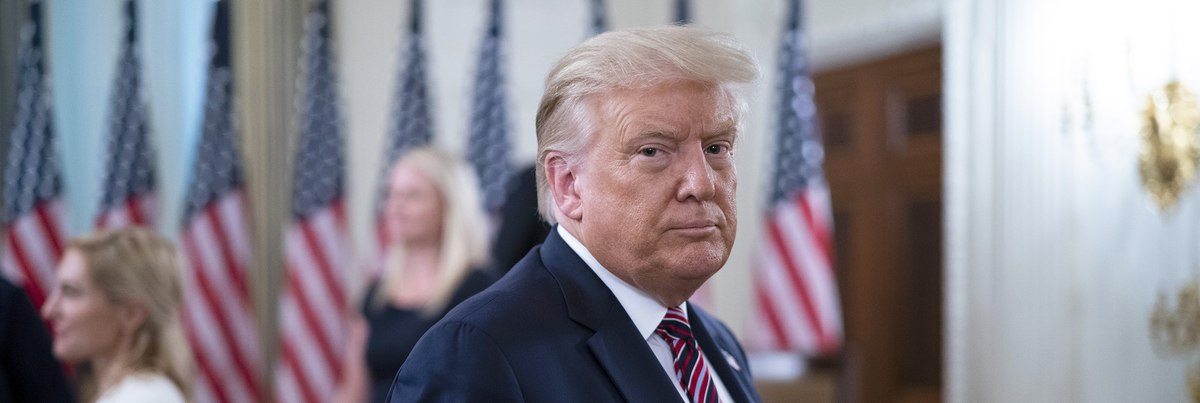Americans are closely divided when it comes to the second impeachment trial of former President Donald Trump, though those who would impeach and convict (47%) outnumber those who would not (42%). But the latest Economist/YouGov poll suggests that even more would prefer that he not be permitted to run for president again.
As has been the case for most of the Trump Administration, opinions are polarized by party, and Independents are generally split. By a narrow margin, Independents would not convict the former president (47% vs 43%), but by 11 points they would not let him run again (49% vs 38%), something which Trump has indicated he might want to do.
Americans remain divided on the issues surrounding this impeachment trial. More than two in five (43%) give the former president “a lot” of responsibility for the January 6 Capitol takeover, which occurred after the then-president addressed a rally of his supporters. Half say Trump should take at least some (51%) responsibility for what happened. But his Republican supporters overwhelmingly disagree. Only 15% of Republicans say he has some or a lot of responsibility for what happened that day, while two-thirds (65%) believe he bears no responsibility for what happened that day.
Following the Capitol takeover, many see domestic terrorism as an immediate and serious threat – but not Republicans
With the Department of Homeland Security warning about domestic terrorism, the poll shows a majority (60%) believe domestic terrorism poses an immediate and serious threat (36%) or a somewhat serious threat (24%) to the country. Republicans, however, disagree, mostly calling it either a minor threat (35%) or no threat at all (17%).
Republicans also disagree about the need for government action to protect the government. Three in 10 (29%) think the government should be doing more to fight domestic terrorism, compared with 68% of Democrats and half of Independents (50%). Nearly two-thirds of Republicans (64%) disapprove of the fencing around the Capitol Building put in place after the takeover.
Can Joe Biden solve the divide in America?
The country is still facing the political chasm that exists whenever the public is asked to think about the 2020 election. It is a chasm that President Joe Biden will have to try and fill. More than three months after his election victory, nearly three in four Republicans (74%) still do not accept Biden’s win and believe that he is not the legitimately elected president. Three in five Republicans (60%) are upset when they asked how they feel about the next four years with Biden in the While House, up seven points from last week’s poll.
Democrats, on the other hand, are beginning to have renewed faith in the direction of the country. Prior to the election, just 4% of Democrats thought the country was headed in the right direction. But that percentage has increased dramatically – and continues to increase since President Biden took office. Now, 62% of Democrats say the country is going in the right direction, and the percentage continues to grow: it is 14 points higher than it was a week ago. GOP opinion has gone the other way. Right before the election, 60% of Republicans thought the country was on the right track. That has dropped since the election and Inauguration to 13% this week.
While those changes – at least those among Democrats – may seem positive for President Biden, there isn’t a lot of hope that he can overcome the country’s divisions. His approval rating is positive (something his predecessor never achieved): 50% approve of how Biden is handling his job, while 37% disapprove. His approval ratings for handling jobs and the economy (48% to 35%), climate change and the environment (46% to 36%), and even taxes and spending (44% to 38%) are positive. But can he bring the country together? Even some Democrats are skeptical. Barely half of Democrats (53%) believe he can do that.
See the toplines and crosstabs from this week’s Economist/YouGov poll
Methodology: The Economist survey was conducted by YouGov using a nationally representative sample of 1,500 US Adult Citizens interviewed online between February 6 - 9, 2021. This sample was weighted according to gender, age, race, and education based on the American Community Survey, conducted by the US Bureau of the Census, as well as 2016 Presidential vote, registration status, geographic region, and news interest. Respondents were selected from YouGov’s opt-in panel to be representative of all US citizens. The margin of error is approximately 3.0% for the overall sample.
Image: Getty










